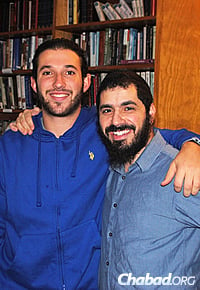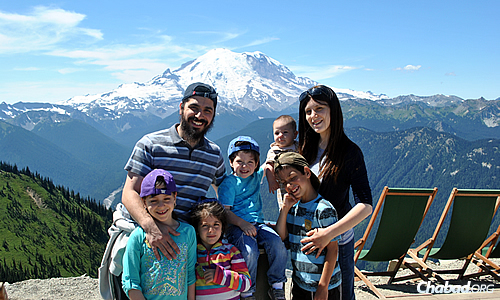Rabbi Elie Estrin is slated to make history.
The Chabad-Lubavitch rabbi, who co-directs the Rohr Chabad Jewish Student Center at the University of Washington in Seattle with his wife, Chaya, is set to become the first bearded chaplain in the U.S. Air Force since the lifting of a ban on beards by the Pentagon earlier this year.
The ceremony will be held on Wednesday, Sept. 10, at the McCord Air Force Base at Fort Lewis in Washington. Rabbi Sanford Dresin of the Aleph Institute, a retired colonel himself, will perform the ceremony. The Aleph Institute is a national, nonprofit charitable institution that addresses the religious, educational, humanitarian and advocacy needs of those in the military and institutional environments, and their families; it was founded by Rabbi Sholom D. Lipskar under the direction of the Lubavitcher Rebbe, Rabbi Menachem M. Schneerson, of righteous memory.
According to Estrin, 34 and the father of five children, the road to the armed services was “a logical extension of his existing service to the Jewish community.”
In their 10 years at the University of Washington, Estrin notes that more than a dozen students that he and his wife were close with had joined the military. After speaking with an alumnus who served in the prestigious U.S. Army Rangers, he became convinced that chaplaincy was an ideal fit.
It was not until this past January, however, when a ban on wearing a beard and other displays of religious belief was lifted by the Pentagon that Estrin was able to pursue his vision.

Initially, Estrin considered joining the National Guard. When he spoke to a recruiting officer and explained his desire to serve as a chaplain, the woman recruiter was surprised. “You’re a real gem,” she declared. “We need chaplains, and even more so, rabbis.”
Ultimately, however, it was the U.S. Air Force Reserves that won Estrin’s commitment.
The Timing Is Just Right
As part of the chaplaincy, Estrin will need to take part in a month-long officer-training program at the Maxwell Air Force in Alabama. He will also need to take a chaplaincy course at Fort Jackson in South Carolina.
Throughout the process, Estrin has found that his decision to become a chaplain has been roundly encouraged by the students and professors he serves.
“There’s an instant bond with students who served in the army and with students who are part of ROTC, the Reserve Officers’ Training Corps. Everyone understands the self-sacrifice of the soldiers and appreciates my dedication to help them,” he said.
The rabbi finds the timing of the ceremony—during the Hebrew month of Elul, when Jews traditionally prepare for the High Holidays—to be particularly pertinent.
“There is a powerful message in service,” Estrin explained. “The realization that you’re part of something far greater, that there’s a responsibility to put your desires aside for the greater good, is something very apropos before Rosh Hashanah.”




Join the Discussion